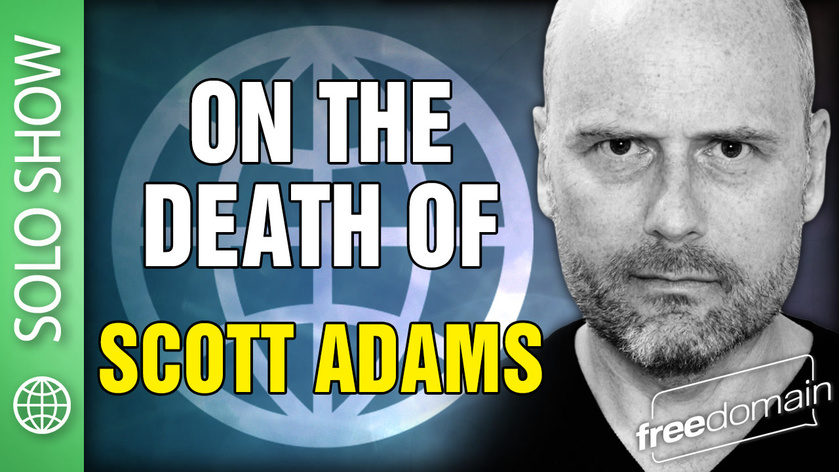If you are not already a supporter checkout everything you are missing out on in the Preview Article.

Join the PREMIUM philosophy community on the web for free!
Get access to StefBOT-AI, private livestreams, premium call in shows, my new book and the History of Philosophers series!
See you soon!
https://freedomain.locals.com/support/promo/UPB2022
I really appreciate your philosophical definition of “love”, but find that I’m left with a blank space in my brain trying to describe so many relationships now. I know people who choose to not strive toward virtue but for whom I still have affection. I can’t “love” them, but I wish them well and are rooting for them to choose better and be happy. I agree with you about how profoundly language matters, and this is a something I’m stuck on. Is there perhaps a Greek word to describe this? “Agape” maybe?
Is there a philosophical basis for the modern phenomenon of being called out for “mansplaining?”
ARTICLES:
"Men score higher on financial knowledge than women, but why?"
"Men score somewhat higher than women on the science knowledge scale overall"
"Women living in the world's most advanced democracies and under the most progressive gender equality regimes still know less about politics than men. Indeed, an unmistakable gender gap in political knowledge seems to be a global phenomenon, according to a ten-nation study of media systems and national political knowledge funded by the Economic and Social Research Council (ESRC)."
I've been thinking a lot lately about how much I should love people. I don't mean people I know; I treat people I meet as well as I can the first time I meet them and then treat them either as well as they treat me, or as well as I have to treat them for utilitarian reasons, whichever is better. But my question pertains to humanity in the abstract. I am coming to terms with the fact that I do not love people, do not love humanity (hesitant to say "I hate people" but that's kinda the thought).
I've been trying to devote my life to caring for others and helping to make the world better for people, but I'm starting to think pretty seriously about abandoning ship before it sinks, which means abandoning the people I casually interact with, the children whose lives I'm improving, and in a sense abandoning my efforts to improve the world to just save myself. How do I know when it's time to release everyone else to their possibly horrific fate, including all these young people who are not responsible for what's coming to them? My heart breaks for these young people even while my view of the adults around them hardens in me that they deserve what's coming to them; American leftists deserve the dictatorship they're building for themselves, and American conservatives deserve to lose because they just won't understand the origins of totalitarianism in child abuse and their own errors and hubris.
Imagine you're creating a family motto for your coat of arms (armorial achievement); what are those words you choose to live by? 🛡️
All donors get the Peaceful Parenting book / audiobook / AI access to share with any and all parents you know who need help!
THANK YOU SO MUCH!
Stefan Molyneux digs into the challenges of romantic relationships, particularly how men and women interact. He pushes back against the idea that equality means being identical, pointing out that real differences shape what people can do and how they excel. Drawing from things like how siblings get along or gaps in pay, he stresses the need to appreciate what each person brings to the table. He also looks at how mismatched ways of talking can lead to confusion, and suggests embracing those differences instead of letting them cause friction. In the end, Molyneux calls for an approach to equality that respects personal traits as key to solid partnerships.
0:00:00 Relationships and Equality
0:02:37 The Illusion of Sameness
0:04:28 Athletic Abilities and Ethnic Differences
0:08:28 The Roadies of Life
0:11:51 Recognizing Unique Talents
0:15:24 The Cry of Unfairness
0:17:11 Embracing Differences in Relationships
0:18:37 Judging by Standards
0:23:56 Nature’s Design in Gender Roles
0:27:00 ...
Stefan Molyneux takes on a debate about feminism between Ana Kasparian and Pearl Davis in his Freedomain podcast. He discusses Pearl's arguments on women's roles in the economy, tying them to falling birth rates and broader effects on society. Molyneux breaks down some common misunderstandings in economic data and digs into the nuances of gender expectations and family life. In the end, he questions what modern feminism really means and encourages people to join the conversation.
Stefan will be there March 28, 2026, he hopes to see you there!
Find Word War Debate on X: https://x.com/WordWarDebate
0:00:00 Introduction to the Debate
0:01:10 Unpacking Feminism's Economic Impact
0:05:59 The Government's Role in Female Employment
0:14:17 Domestic Violence Statistics and Feminism
0:16:56 Title IX and Its Implications
0:23:08 The Debate on Modern Relationships
0:28:20 The Case of Terrence Pop
0:32:22 The Effects of Feminism on Men
0:41:01 The Statistics of Divorce
0:49:00 Child Support and Alimony ...
Stefan Molyneux looks back at Scott Adams' life and work now that he's gone. He mentions how Adams' creations resonated with him over the years, touches on the mixed aspects of Adams' time in the spotlight, and notes the way he dealt with his approaching death. Molyneux reviews Adams' evolving take on the COVID-19 vaccine and explains his own stance against getting vaccinated, while pointing out that people should decide for themselves. He considers whether Adams' habits and the demands of public life contributed to his prostate cancer. Molyneux also discusses stress and its effects on the body, suggesting that folks focus on solid character when choosing who to keep close and take stock of their priorities.
Preview at the Premium Content Hub: https://premium.freedomain.com/500abd01/on-the-death-of-scott-adams
Subscribers can access this content at:
X: https://x.com/StefanMolyneux/status/2011472099777393114
Locals: https://freedomain.locals.com/post/7601218/on-the-death-of-scott-adams
Subscribestar: ...

The Truth About Sports!
Join the space LIVE:
https://twitter.com/i/spaces/1zqKVdXrbVMJB
You can also listen via our streaming platforms:
YouTube: https://fdrurl.com/youtube-live
Locals: https://fdrurl.com/locals-live
Substack: https://fdrurl.com/substack-live
Rumble: https://fdrurl.com/rumble-live
Odysee: https://fdrurl.com/odysee-live
DLive: https://fdrurl.com/dlive
Kick: https://fdrurl.com/kick
Unauthorized TV: https://fdrurl.com/uatv-live

The Truth About Sports!
Set a reminder to join the space LIVE:
https://twitter.com/i/spaces/1zqKVdXrbVMJB
You can also listen via our streaming platforms:
YouTube: https://fdrurl.com/youtube-live
Locals: https://fdrurl.com/locals-live
Substack: https://fdrurl.com/substack-live
Rumble: https://fdrurl.com/rumble-live
Odysee: https://fdrurl.com/odysee-live
DLive: https://fdrurl.com/dlive
Kick: https://fdrurl.com/kick
Unauthorized TV: https://fdrurl.com/uatv-live


If you are not already a supporter checkout everything you are missing out on in the Preview Article.